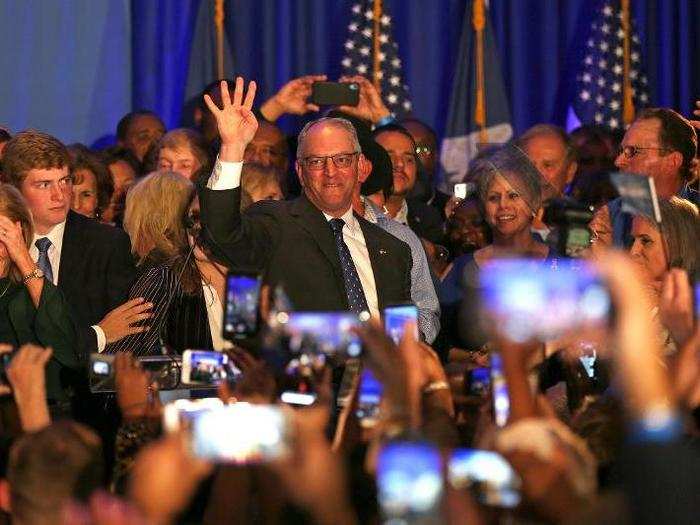
Louisiana is a red state that Trump won by 20 percentage points in 2016, but its statewide government is mixed. Edwards is the first Democratic governor to win re-election since 1975, and he is currently the only statewide elected Democrat.
Part of Edwards' appeal stems from his more conservative leanings. On issues like abortion and gun ownership, he strays to the right of his Democratic peers. For example, in 2019, Edwards signed one of the most restrictive anti-abortion bills in the country.
Edwards has compared himself to Trump on gun control, saying that he doesn't support background checks on all gun purchases, but just commercial ones, according to Louisiana's The Advocate.

After signing the restrictive "fetal heartbeat" bill that would ban abortion once the fetus' heartbeat could be detected, Edwards faced backlash from his more progressive base.
The controversial bill signage prompted him to release a statement pointing out that he has championed other progressive causes, like signing an executive order to protect LGBT people from harassment or job dismissals.
Edwards also expanded Medicaid and worked to reduce the prison population in Louisiana, more traditional Democratic policies. But his balancing act, which included him promising to work with Trump and the Trump administration, has won him conservative support, too.

Louisiana has been plagued for years by budget deficits, and Edwards was more than willing to cross party lines to negotiate cuts. He appointed a Republican who was a former rival of his as commissioner of his administration.
Edwards also believes in having a Republican voice in his major policy decisions, and his administration includes several senior officials who are Republicans, along with appointees left over from his Republican predecessors.
"I think there are some in my party who believe that the current dysfunction in the Republican Party and the low approval ratings of our president means that we're going to automatically be successful going forward. I reject that idea," Edwards told Governing in January 2018.
"It means that we have the opportunity to be successful. But we have to go out and seize the middle of the political spectrum. You don't get it by simply not being a Republican."

Edwards, in addition to his mixed stance on issues, had a traditional political background. He attended the United States Military Academy and served in the US Army for eight years before becoming an attorney.
Louisiana politics can be unpredictable. Edwards won his first gubernatorial election in large part because his opponent, then-US Senator David Vitter, was accused of hiring a prostitute in the early 2000s. That's the environment that Trump was trying to make headway in.
His opposition, Eddie Rispone, does not have a traditional background in politics. Rather, he founded a construction company that has annual revenues of $350 million. Rispone also chaired the Louisiana Workforce Investment Council under former Louisiana Governor Bobby Jindal, who Edwards was critical of.

Edwards first ran for office in 2017, winning a seat in the Louisiana House of Representatives. He was the only freshman lawmaker to chair a committee – the Veterans Affairs Committee. Edwards was also selected as chairman of the Democratic house caucus.
In 2011, he was re-elected. Both times, Edwards won by a large majority. But his first governor's race in 2015 was much closer, with 56.1 percent of the vote.
Early struggles as a Democratic governor in a state with a legislative Republican majority included Edwards trying and failing to persuade the Louisiana House to choose a Democratic Speaker. Since the 1920s, Louisiana governors had traditionally handpicked Speakers.

On Nov. 5, Kentucky's gubernatorial race ended with the red state's Democratic attorney general, Andy Beshear, beating the incumbent Governor Matt Bevin, who was endorsed by Trump in addition to Rispone.
The two high-profile gubernatorial losses for Trump candidates in red states that voted for Trump in the 2016 election could indicate that his pull is waning in light of his first term.
In addition to those two gubernatorial races, Democrats flipped suburban Delaware County in Pennsylvania, which had been red since the Civil War. It's unclear just how much these races have to say about the 2020 election, but the Democratic wins in red states don't look good for Trump.
 I spent $2,000 for 7 nights in a 179-square-foot room on one of the world's largest cruise ships. Take a look inside my cabin.
I spent $2,000 for 7 nights in a 179-square-foot room on one of the world's largest cruise ships. Take a look inside my cabin. Saudi Arabia wants China to help fund its struggling $500 billion Neom megaproject. Investors may not be too excited.
Saudi Arabia wants China to help fund its struggling $500 billion Neom megaproject. Investors may not be too excited. Colon cancer rates are rising in young people. If you have two symptoms you should get a colonoscopy, a GI oncologist says.
Colon cancer rates are rising in young people. If you have two symptoms you should get a colonoscopy, a GI oncologist says. Tired of blatant misinformation in the media? This video game can help you and your family fight fake news!
Tired of blatant misinformation in the media? This video game can help you and your family fight fake news!
 Tired of blatant misinformation in the media? This video game can help you and your family fight fake news!
Tired of blatant misinformation in the media? This video game can help you and your family fight fake news!
 JNK India IPO allotment – How to check allotment, GMP, listing date and more
JNK India IPO allotment – How to check allotment, GMP, listing date and more

Copyright © 2024. Times Internet Limited. All rights reserved.For reprint rights. Times Syndication Service.